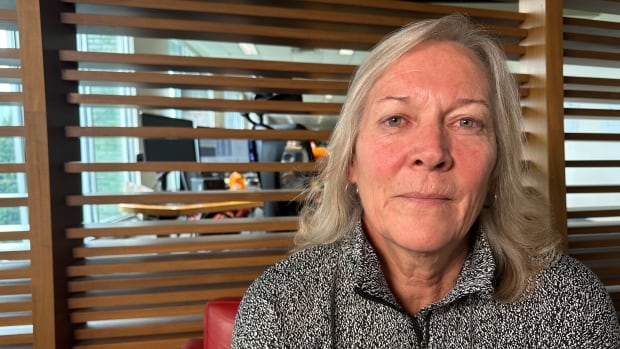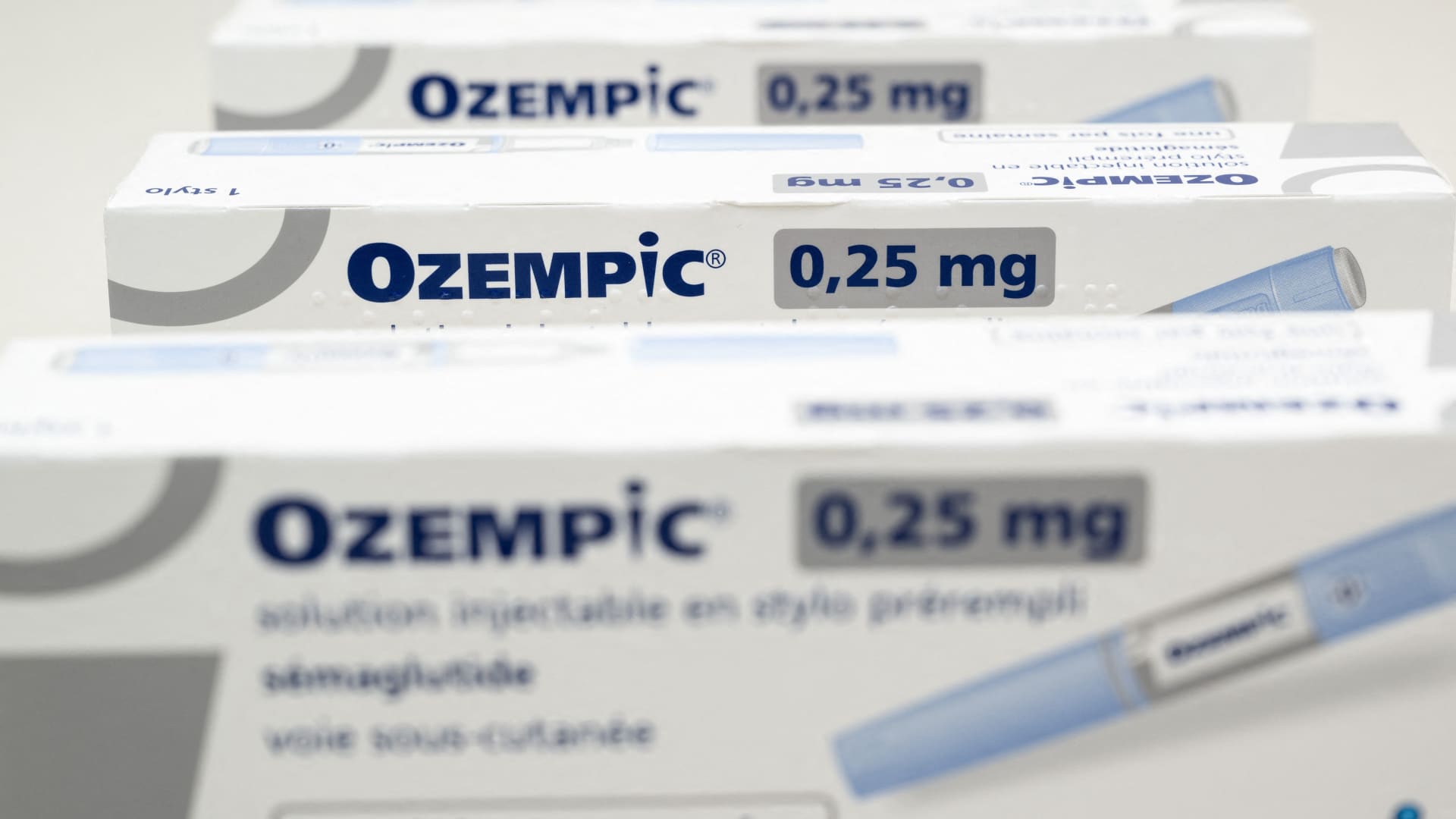Members of the body that advises Alberta Health Services about 2SLGBTQ+ health care were surprised by Premier Danielle Smith’s proposed transgender policies announcement earlier this year, according to internal records obtained by CBC News.
In a video posted to social media on Jan. 31, Smith laid out a host of proposed policies focused on transgender youth, including several regarding gender-affirming care. She formally announced the policies at a news conference the following day.
Records obtained by CBC News through a freedom of information request highlight concerns raised by members of the AHS Sexual Orientation, Gender Identity and Expression (SOGIE) provincial advisory council in the days after the premier announced the proposed policies.
“This announcement is politically motivated and not based in fact or clinical guidelines,” one council member wrote in a Feb. 2 email to two named AHS officials and other recipients whose email addresses were redacted. The sender’s identity was also protected under privacy legislation.
“I believe we have an obligation to inform (as per our mandate) those in our sphere of influence, which includes the public, and leaders within the organization with the right information,” the email said, adding that the council also needed to convey “the damage this policy does to the health of 2SLGBTQ Albertans especially those kids.”
The SOGIE council acts as a liaison between AHS and 2SLGBTQ+ patients, their families and care providers. It does not report to the provincial government.
Among other things, the government’s proposed policies would ban top and bottom surgeries for anyone under 18 (Doctors say bottom surgeries aren’t performed on youth and top surgeries are rare.)
Puberty blockers and hormone therapies would not be permitted for those under 16, unless someone has already started treatment.
Teens aged 16 or 17 could start hormone therapies if they are deemed mature enough and have parental, physician and psychologist approval.
The government is providing additional support to help transgender adults access health care, including trying to attract specialists in transgender care to Alberta, Sam Blackett, press secretary for the premier’s office, said in a statement.
Alberta Premier Danielle Smith announced policy changes that would put minimum legal age limits on surgeries and hormone therapies for transgender youth. It will also require parental notification — and permission, depending on the student’s age — if a student wants to change their name or pronoun at school.
The province is also creating a private registry of specialists to make it easier for gender-diverse Albertans to access health care, and developing a pilot project that will see counsellors help transgender youth and their families, Blackett said.
The policies are designed to “preserve the choices children and youth have before potentially making life-altering and often irreversible adult decisions,” he said, echoing words Smith has used.
Blackett did not answer whether the government notified AHS before announcing the potential policy changes. AHS did not confirm if it had been notified in advance of Smith’s announcement.
However, records show that less than two hours after Smith’s Jan. 31 video was posted online, an AHS senior communications official flagged it in an email to leadership, including president and CEO Athana Mentzelopoulos.
“The Premier put out this video this afternoon,” the communications official wrote, including the hyperlink to the social media post. “She outlines changes to care options for transgender children in Alberta. No news release that I’ve seen yet or documentation that I can link to.”
‘Hard to live here right now’
The SOGIE council’s primary function is to “consider and provide evidence-based suggestions to AHS” to help develop strategies and policies, and, ultimately, deliver inclusive health care, according to the bylaw that established it.
CBC News obtained documents after filing a freedom of information request to AHS on Feb. 8, seeking records about the proposed policies since May 29, 2023, when Smith and the United Conservative Party won the provincial election.
The records show that council members started emailing each other and AHS staff the morning of Feb. 1, questioning how much consultation had occurred and wondering how to proceed.
“This is such a sad move against our communities. Hard to live here right now,” wrote one council member.
The records show that Dr. Sid Viner, an AHS vice-president and the medical director of clinical operations, who acts as a support person for the council, started gathering further information about gender-affirming care in the province.

“The Premier’s announcement about transgender care has caused a lot of concern amongst SOGIE [provincial advisory council] members,” Viner wrote in a Feb. 5 email to Mentzelopoulos and a senior communications official.
Council debates how to present info: records
Before 9 a.m. on Feb. 1, one council member sent an email, wondering how the council was involved in the proposed policies and what role, if any, it could play in presenting current research and data.
“I am trying to collect information that can help with clarity, direction and options for the youth, and families I am connected to professionally, and many personally as well,” they said.
Viner, in response to another council member, confirmed that contacting the government as individuals, or through advocacy organizations, would be best. He noted that AHS, the organization in charge of delivering health care to Albertans, has to follow government policy.
He said he was reaching out to clinical leaders for more information about best practices in gender-affirming care to inform health ministry decision-making.
“There is no defined process or forum for this to occur — so the clinicians may need to provide feedback to the Ministry as individuals as well. Far from ideal,” Viner wrote.
In an email on Feb. 5 to Viner and other executives, a council member called the proposed policies a “malicious” attack by the government on transgender people that contradicts evidence and best practice. They also questioned their purpose as a serving member.
“I understand our role is advisory, not advocacy. However, even within that context I no longer see the purpose of my role in light of this decision,” they said. “We have been asked to advise, but never once given the chance to.”
Policies to be tabled this fall
The proposed policies are expected to be tabled in the legislature this fall. Blackett said the goal is to have the policies fully implemented before 2025.
Some will be implemented through regulation and ministerial orders while others may need legislation, he said, adding that “some policy implementation” will need consultation and feedback from stakeholders, including AHS.

The records obtained by CBC show that provincial government officials started contacting AHS about gender-affirming care practices during the first week of February.
In a statement, an AHS spokesperson said the organization regularly consults with the SOGIE advisory council and will continue to do so as the government’s policies are implemented.
Many Albertans agree with policies, polling suggests
The premier’s announcement sparked controversy in Alberta, but polling published soon afterward suggested people support the proposed policies.
Market research firm Leger conducted a national online survey about the proposed policies from Feb. 9 to Feb. 11.
The survey collected an “oversample” of people from Alberta, allowing for a more detailed breakdown of demographic information, but weighted that sample down when comparing nationally to conform to census specifications.
The polling results suggest that 44 per cent of Albertans agree with the government’s proposed policy about gender-affirming surgeries for minors. The same proportion of Albertans believe puberty blockers and hormone therapies for gender affirmation should not be permitted for children aged 15 and under.
Opinions were more divided about older teens: the poll suggests that 28 per cent of Albertans feel it is appropriate to allow mature teens, aged 16 or 17, to start puberty blockers and therapies for gender reassignment and affirmation, if granted approval.




